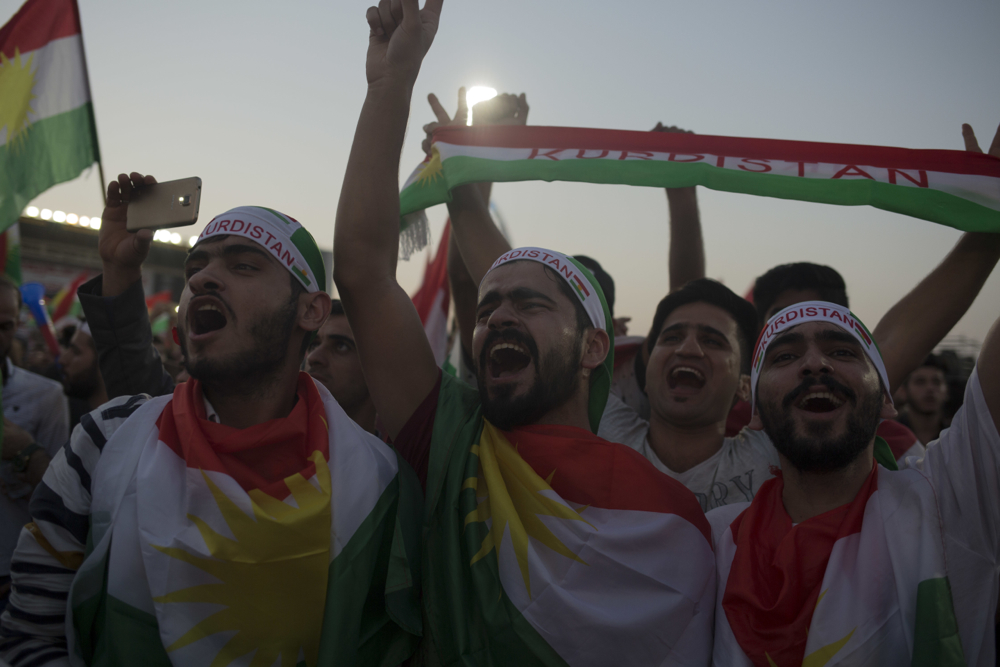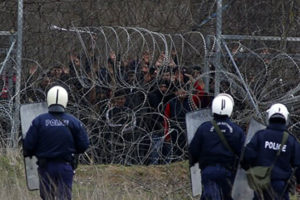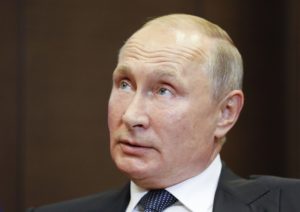A Tiny Crack in the Wall Against Kurdish Independence?
A recent referendum is seen as a wake-up call to Turkey, Iraq, Iran and Syria that the longtime issue must be addressed. Independence supporters wrapped in Kurdish flags chant at a referendum rally in Irbil, Iraq, in September. (Bram Janssen / AP)
Independence supporters wrapped in Kurdish flags chant at a referendum rally in Irbil, Iraq, in September. (Bram Janssen / AP)
Independence has been an elusive dream for the people of Kurdistan for more than a century. At the conclusion of World War I, both the new Turkish Republic in Anatolia and the British in their mandate in Iraq violently repressed efforts to form an independent Kurdish state from the ruins of the Ottoman Empire. In the aftermath of the Soviet occupation of northern Iran during World War II, a short-lived Kurdish state was created, only to be dissolved when the Soviets withdrew and the government in Tehran reasserted its authority.
Today, the dream of Kurdish independence lives on in the four nations where significant Kurdish minorities reside: Turkey, Iraq, Iran and Syria.
In Iraq, where Kurds have enjoyed virtual autonomy since the establishment of a no-fly zone following the 1991 Gulf War, the drive for Kurdish independence was accelerated after the fall of Saddam Hussein and the discovery of commercially viable oil and gas deposits. That discovery, for the first time, provided the possibility of Kurdish economic viability.
Geography, however, has worked against the Kurds of Iraq. Being landlocked, the Iraqi Kurds are dependent on their neighbors—particularly Turkey and, to a lesser extent, Iran—to transport their natural resources to market. The Kurds of Iraq also are tethered to the banking system of Iraq, which regulates currency transactions.
Moreover, the distribution of Kurds among Turkey, Iraq, Iran and Syria precludes any single effort toward independence in one country in a geopolitical vacuum. The reality is that any developments on Kurdish independence in any of these nations will resonate in all four.
The recent referendum on independence held in the territories of Iraq controlled by the Kurdish Regional Government (KRG) is no exception to this rule. When more than 92 percent of the Kurds of Iraq indicate their desire for independence (as was this case here), it doesn’t take a leap of logic to assess that a similar number of independence-minded Kurds reside in Turkey, Iran and Syria. As such, the issue of Kurdish independence becomes a blade that cuts all nations equally.
Iraq and Iran learned this lesson the hard way during their eight-year war in the 1980s, when both nations supported the independence aspirations of Kurds residing in the other’s territory. The result was violence that continues to this day. For Turkey, the autonomy enjoyed by Iraqi Kurds over the past decades has only exacerbated Turkey’s ongoing struggles with its own restive Kurdish population. The same holds true for the Kurds of Syria who, since the beginning of civil war in Syria in 2011, have asserted their own autonomy and flirted with the issue of independence.
The question of Kurdish independence has, in recent years, been viewed as a matter of when, not if. The issue has always been one of timing—and, on Kurdish independence, there never seems to be a good time. The territories populated by Kurds are not insignificant, and the loss of such an expanse of land, not to mention the natural resources contained within, would pose an existential threat to the nations involved.
Likewise, the issue of the inviolability of national borders precludes the Kurds from garnering support from many nations otherwise sympathetic to the plight of the Kurdish people. Europe and the United States in particular have frowned on referendums of this nature. One need only look at their rejection of the Russian referendum in Crimea and the rejection of the Catalan referendum in Spain to underscore this fact.
European stability in the post-World War II era is predicated upon stability engendered by the collective recognition that present-day borders are not malleable. The dissolution of Yugoslavia was achieved not by inventing new geographical entities but by shifting populations, when necessary, to conform to existing geopolitical designations—Slovenia, Croatia, Bosnia-Herzegovina, Serbia, Montenegro and Kosovo. The need for finality is deemed absolute. Otherwise, what would stop the Germans from eyeing lost territories in Poland, and Poland from doing the same in Ukraine? If the North Atlantic liberal order were to accept the Kurdish referendum as legitimate, these scenarios, and others, become a nightmarish possibility. Even Russia, which has played the referendum card to its own benefit and is historically supportive of Kurdish independence, recognizes the inherently destabilizing impact any move toward Kurdish independence would have on a region already torn by ethnic and sectarian strife. Israel, the only nation supporting the Kurdish referendum, does so on the basis that it will prove disruptive to Iranian regional aspirations. Clearly, this chaos theory is not embraced by any other nation.
The fact is that any effort by the Kurds of Iraq to push forward with independence at this time will be forcefully resisted by neighbors. Iraq and Turkey have held joint maneuvers near Iraqi Kurdistan, and Iran has massed troops on its border with Iraqi Kurdistan. While the Kurds have garnered a reputation for being fierce fighters over the years, they are not invincible, and there is little doubt that the Kurdish forces would be defeated in detail by the combined forces of the three major neighbors.
At the same time, an effort undertaken by Turkey against the KRG likely would include a military effort, probably in conjunction with Iranian and Iraqi forces, to nip in the bud any similar drive for Kurdish independence in Syria. Such a move would not take place in a vacuum, and both Turkey and Iran would be forced to simultaneously subdue Kurdish unrest on their respective territories. In short, any effort to violently terminate Kurdish independence in Iraqi Kurdistan would result in a conflict that would destabilize the entire region.
The biggest benefactor of such a conflict would be Islamic State. Currently reeling from major setbacks in Iraq (Mosul) and Syria (Raqqa), Islamic State, in the face of a regional Kurdish conflict, likely would be able to stabilize the desperate situation it faces on the battlefield. It could also exploit the geopolitical faults that such a conflict would induce, literally snatching victory from the jaws of defeat. The Kurds view Islamic State as an existential threat and, as such, have made common cause with Iraq, Turkey, Iran and Syria (as well as the United States and Russia) to defeat it, militarily and politically. The Kurds know all too well they would pay a heavy price as a result of any resurgence of Islamic State. For this reason, it is highly unlikely the KRG would do anything that strengthened the hand of Islamic State at this late stage of the fighting.
The Kurds of northern Iraq want independence. They are not, however, suicidal. Neither are their neighbors. There seems to be a general recognition by all parties that any attempt at a military solution to the question of Kurdish independence would be to the detriment of all involved. The effort by Turkey to manage Iraqi Kurdish autonomy since the overthrow of Saddam has resulted in the economies of Turkey and Iraqi Kurdistan becoming intertwined to a degree previously unimaginable. If Turkey were to follow up on its threat to close the oil pipeline connecting the Kurdish oil fields to Turkish ports, the Turkish economy would be impacted at a time when it cannot afford such uncertainty.
The same holds true, to a lesser extent, for the Syrian and Iranian economies. The key to managing the issue of Kurdish independence has been to integrate to the greatest extent possible the economic well-being of the Kurds with the economic fortunes of its neighbors. While the civil war in Syria and the ongoing struggle against Islamic State have made such integration imperfect, the reality is Kurdistan cannot exist in economic isolation from its neighbors. Nor can the economies of Turkey, Iraq, Iran and Syria thrive in isolation from the Kurds.
This mutual necessity will, for the time being, prevent the Kurdish independence referendum from starting a full-scale regional conflict. The KRG is only too aware of its limited military and economic resources. Lacking outside support (that will not be forthcoming), the KRG would cease to exist as a geopolitical reality if such a war broke out. Likewise, the political leaders in Turkey, Iraq and Iran (and to a lesser extent, Syria) know that a war with the KRG would unleash forces within and without their respective borders that would take years to suppress. The economies of all these nations are fragile, and the last thing they need or want is an unwinnable war that will accomplish nothing while sapping their economic vitality.
Cooler heads seem to be prevailing on all sides of the Kurdish independence equation. From the Kurdish perspective, the referendum sent a clear signal to all neighbors that the question of Kurdish independence will need to be addressed eventually. This wake-up call was heard in Baghdad, Ankara, Tehran and Damascus, as well as Brussels, Moscow and Washington, D.C.
As the civil war in Syria and the fight against Islamic State reach their respective conclusions, the attention of all parties will return to the question of Kurdish independence. Having stared the prospect of war in the face and found it wanting, the parties feel that a diplomatic solution to this most pressing issue may be found.
One thing is for certain—the referendum cannot be undone. The Kurds want independence. For the moment at least, pragmatism seems to have prevailed over the forces of reactionism. How long this will remain the case, nobody knows.
Your support matters…Independent journalism is under threat and overshadowed by heavily funded mainstream media.
You can help level the playing field. Become a member.
Your tax-deductible contribution keeps us digging beneath the headlines to give you thought-provoking, investigative reporting and analysis that unearths what's really happening- without compromise.
Give today to support our courageous, independent journalists.






You need to be a supporter to comment.
There are currently no responses to this article.
Be the first to respond.